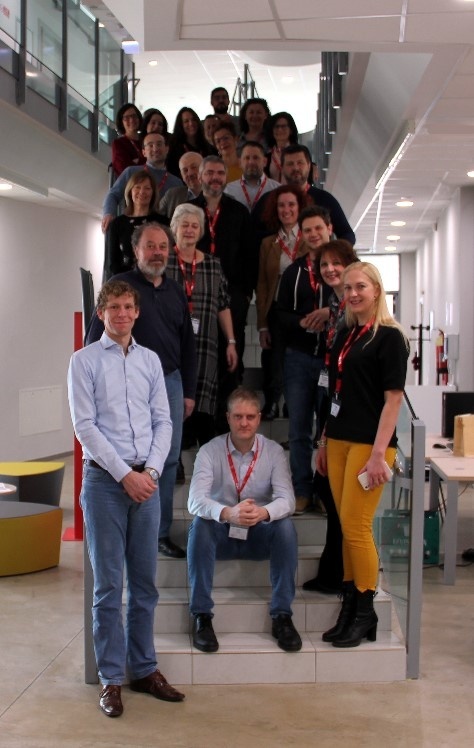The articles of the current edition are available on the new site.

Training a new generation of creative, enterprising and innovative researchers, prepared to deal with current and future challenges in the fields of tissue engineering and to translate knowledge and ideas into products and services for economic and social benefit: thanks to the training received within the project PREMUROSA – Precision Medicine for Muscoloskeletal Regeneration, Prosthetics, and Active Ageing, a number of European experts will develop new technologies and therapies for musculoskeletal disorders.
The project – part of the “Marie Sklodowska-Curie Innovative Training Network-European Joint Doctorates” programme, funded by Horizon 2020 – will develop a three-year programme focused on precision medicine for the musculoskeletal regeneration, prostheses and active ageing. Thirteen young researchers will in fact be selected for a specific PhD project, with competences that vary from materials science to biology and surgery. They will be hosted by universities, research institutions and companies in Italy, Switzerland, Portugal, Finland, Latvia, Ireland and Serbia.
The field of study is very current: musculoskeletal disorders nowadays affect almost half of over-60 population, with a huge impact on the quality of life and a significant burden on health and welfare systems. The treatment of such disorders is currently based either on prosthetic or regenerative surgical procedures, often involving medical device implantation, which compromises the effectiveness of treatments. A significant improvement could be achieved by precision medicine, specifically designed on patient’s individual characteristics. This requires new and highly skilled professionals who will develop new strategies for translating tissue engineering innovations into useful information to customize therapies, taking into account the characteristics of each patient.
Politecnico di Torino and other 10 partners will be coordinated by the Università del Piemonte Orientale. The other involved institutions are: Istituto Ortopedico Rizzoli (Bologna), Aalto University Foundation (Aalto, Finlandia), AO Research Institute Davos (Davos, Svizzera), Riga Technical University (Riga, Lettonia), Faculty of Technology and Metallurgy, University of Belgrade (Belgrade, Serbia), INEB—National Institute of Biomedical Engineering, University of Porto (Porto, Portogallo), EnginSoft SpA (Trento), Tampere University of Technology, (Tampere, Finlandia), National University of Ireland Galway (Galway, Irlanda).
 The members of the PREMUROSA project at Università del Piemonte Orientale’s Center for Translational Research on Autoimmune Diseases and Allergies - CAAD
The members of the PREMUROSA project at Università del Piemonte Orientale’s Center for Translational Research on Autoimmune Diseases and Allergies - CAAD
Politecnico di Torino will host one of the PhD students for the development and characterization of model biomaterials for the musculoskeletal regeneration, under the scientific responsibility of Prof. Enrica Verné, Department of Applied Science and Technology, together with Silvia Spriano, Francesco Baino, Marta Miola e Sara Ferraris, members of the GLANCE research group.
“It’s crucial to understand the role of the composition, surface topography and porosity of biomaterials and their interaction with cells and musculoskeletal tissue. It consists in the basis for the realization of customized materials, designed according with the characteristics and need of each patient – explains prof. Enrica Verné with regards to the scientific role of the Politecnico within the project – Several ‘model materials’ will be designed with this purpose, including titanium alloys, bioactive glass and glass ceramics, which will be prepared in various variants (massive, micro-dusts and nano-dusts, hierarchical porosity scaffold from macro-scale to meso-scale), with optimized chemical compositions (obtained by doping with ionic species with specific biological functions), or with a customized superficial reactivity obtained through topographic modifications and surface functionalization, which will help to modulate the inflammatory response and cellular oxidative stress. The biomaterials under analysis will be shared with the entire consortium, in order to identify customized protocols for their clinical application.”
PREMUROSA will not only set the ground for innovative PhD training but also contribute to deal with relevant societal challenges, such as the optimization of clinical choices and the resulting improvement of the quality of life of patients and reduction of healthcare system costs. Moreover, industrial competitiveness will be substantially boosted thanks to the optimization of medical devices and to the development of new products.